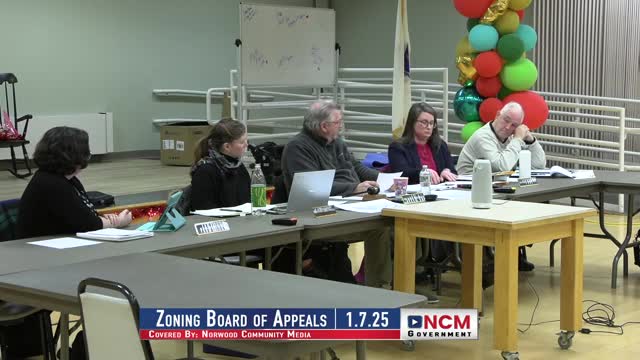Zoning board denies accessory-parking permit for car-rental lot at Boston Providence Turnpike, 3–2
Get AI-powered insights, summaries, and transcripts
Subscribe
Summary
The Norwood Zoning Board of Appeals denied a special-permit application to allow accessory parking for a car-rental operation at Boston Providence Turnpike after split deliberations about neighborhood impacts, business need and precedent; the motion to approve failed 3–2.
The Norwood Zoning Board of Appeals denied a special-permit application to allow accessory parking for a car-rental operation at a parcel on Boston Providence Turnpike, rejecting a motion to approve after split deliberations that weighed neighborhood impacts against the applicant’s asserted operational needs.
The application, docketed as case 2024-23596, sought accessory parking in a newly residentially zoned parcel that the applicant proposed to use in support of a car-rental business across the street. Planning-board members earlier had denied a larger request for open storage and more spaces; the applicant reduced its request for Zoning Board consideration. At the ZBA meeting board members focused on visual compatibility, fiscal and neighborhood impacts, and whether the proposed use fit the zoning definition of accessory parking.
Town counsel and planning staff told the board the present request differs from the earlier planning-board denial because the applicant narrowed the scope: the planning board had considered up to 144 spaces in the commercial zoning regime, while the present application is limited to registered vehicles and is subject to accessory-parking rules that apply in the residential zoning classification. Town counsel explained the rezoning changed setback rules, moving parking farther from residences.
Board members questioned whether the applicant had demonstrated a sufficient business need and whether the project would harm neighborhood character. Member Rachel Allen summarized the majority’s view: “the majority of the adverse effects for them, outweigh the beneficial effects.” Several members said the applicant scaled back the plan and responded to concerns but that material questions remained about business necessity and environmental and visual impacts.
One board member cautioned that denial could prompt litigation and possible adverse outcomes. As a member summarized his concern: if the board denies the permit and loses on appeal, the town could face a worse outcome allowing open lot storage; he said, “if we do lose, the courts could give mister Spiegel freehand to go back to open lot storage.”
Board members debated conditions proposed by supporters of approval, including replacing any tree removed that is 2 inches in diameter or larger, planting an 8-foot row of screening trees, limiting hours of operations to end no later than 8 p.m., restricting deliveries by car carriers, placing lighting on the east side facing the highway with low candela limits, and requiring planning-board site-plan review. A motion to approve the application with those conditions was made and seconded; the roll call recorded three affirmative votes (including the chair), two negative votes and no abstentions. Because the motion failed by a 3–2 count, the application was denied.
The record shows planning staff and the board considered several quantitative details submitted by the applicant: the planning board had earlier denied a request for 144 parking spaces; the applicant had proposed 99 parking spaces before scaling the plan; the currently proposed disturbance affects roughly 25% of a 1.8-acre parcel, with the applicant stating that about 75% of the lot would remain in natural habitat. Abutters’ concerns included proximity to houses (one abutter’s buffer was increased from 30 feet in earlier plans to more than 150 feet in the revised plan) and a 20-foot shared buffer at 563 (address provided in record).
Because the motion to approve failed, the board formally denied the application. The meeting record does not document any final appeal or next step; applicants commonly have the option to seek judicial review or to revise and resubmit an application.
